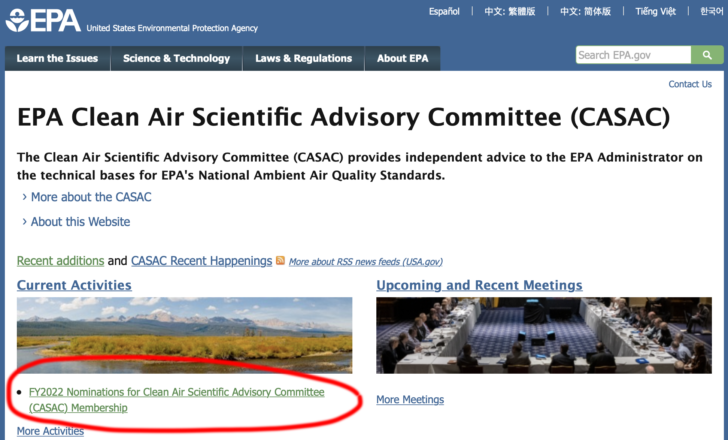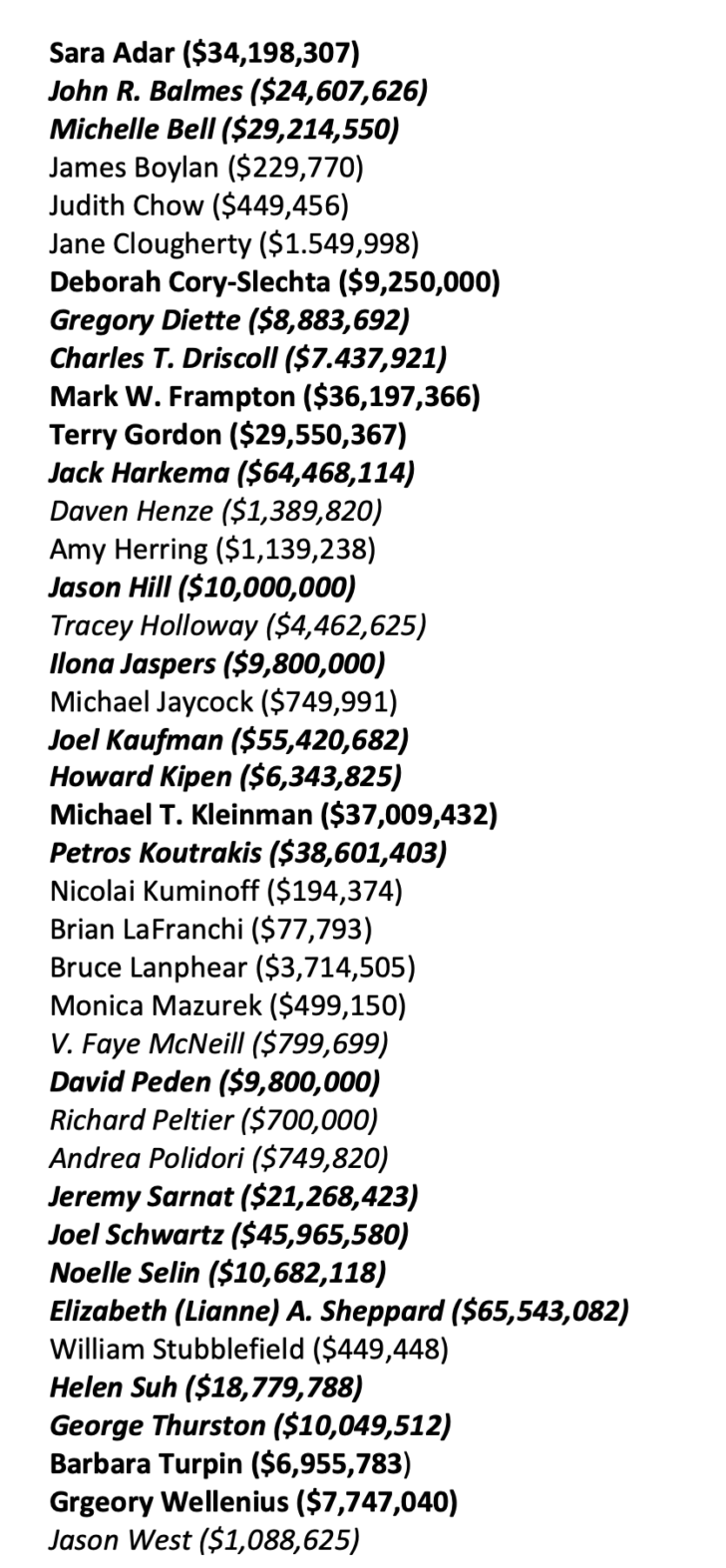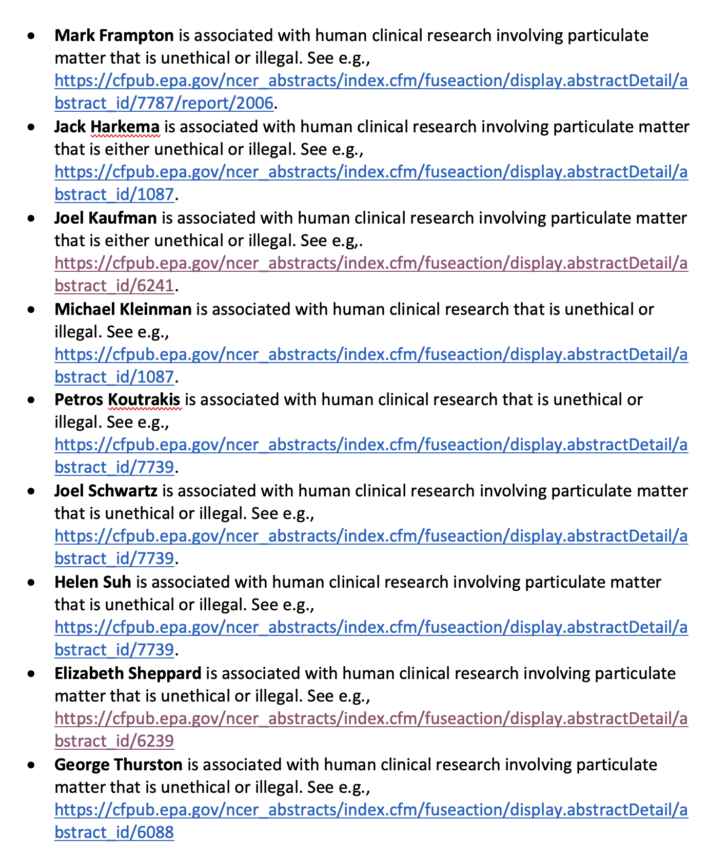Below is my public comment to EPA regarding its selection of members for the Clean Air Scientific Advisory Committee (CASAC).The deadline for filing comments is June 1. So it’s not too late for you to participate. Instructions are here.

May 31, 2021
Mr. Aaron Yeow
Designated Federal Officer
EPA CASAC
I am submitting comments concerning candidates for CASAC, as requested on May 10, 2021.
I have both general comments related to the panel member selection process and specific comments on candidates.
In summary:
- Strive for balance and objectivity. The law requires CASAC to be balanced in terms of points of view. Prior to 2017, CASAC had devolved into a system cronyism where CASAC members with nearly identical viewpoints often reviewed and rubberstamped the results of their own or their colleagues’ EPA-funded research. There also exists the problem of certain candidates (e.g., individuals who have received tens of millions in EPA research grants) having undue influence over more junior colleagues.
- Avoid financial conflicts of interest. EPA should avoid selecting candidates with a financial relationship with the agency. This principle should exclude those candidates who have received or otherwise benefitted from one or more research grants from EPA within the past five (5) years. Moreover selected candidates should agree in writing to not seek, accept or help their institutions obtain research grants from EPA during the next five (5) years.
- No candidates who have participated or benefitted from unethical or illegal research. A number of the candidates for CASAC have conducted, participated in or have benefitted from affiliation with unethical/illegal human clinical experiments with air pollutants. No one who is associated with these unethical/illegal human experiments should be permitted to serve on CASAC.
While it is impossible to describe and proscribe all forms of potential corruption among CASAC members, EPA should strive to select an ethical and honest panel that represents varying points of view and where no panel member is intimated by others.
1. General Comment on Panel Selection
An overall concern is that the new CASAC will not be balanced as is required by law.
The Clean Air Act, 42 U.S.C. § 7409(d)(2) requires that an independent scientific advisory board be named by the Administrator of the EPA which every five years completes a review of the national primary and secondary ambient air quality standards and recommends any new national ambient air quality standards or revisions of existing criteria and standards. Pursuant to this the EPA has created the Clean Air Scientific Advisory Committee (CASAC), and subcommittees beneath the CASAC which deal with particular areas related to air quality such as air monitoring, oxides of nitrogen, sulfur oxides, and particulate matter.
The formation of this mandated committee and these subcommittees falls under the requirements of the Federal Advisory Committee Act (FACA), which imposes requirements upon such bodies, and gives content to the words used to authorize the creation of such committees. FACA specifically notes that any legislation authorizing the creation of an advisory committee or panel shall “contain appropriate provisions to assure that the advice and recommendations of the advisory committee will not be inappropriately influenced by the appointing authority or by any special interest” 5 U.S.C., §5 (3) appx. In the Clean Air Act such a provision is contained through the requirement that the committee being formed and thus and subcommittees being formed beneath it are “independent.” 42 U.S.C. § 7409(d)(2)(a).
The Federal Advisory Committee Act also requires that all committee formed “be fairly balanced in terms of the points of view represented.” 5 U.S.C., §5 (2) appx. In determining whether a committee is fairly balanced courts look to the purpose of the committee, or as here the panel. “In considering whether a committee is fairly balanced… courts naturally have looked first at the functions to be performed.” Cargill, Inc. v. U.S., 173 F.3d 323 (5th Cir.1999). This Court has stated that “the legislative history makes clear, the “fairly balanced” requirement was designed to ensure that persons or groups directly affected by the work of a particular advisory committee would have some representation on the committee” Washington Legal Foundation v. American Bar Ass’n., 648 F.Supp. 1353 (D.D.C. 1986).
Thus the test for whether a committee or panel is ‘fairly balanced’ turns on the purpose for the creation of the committee. Here the Clean Air Act speaks to the overall purpose of the CASAC committee. Its job is to review the proposals put forth by the agency under the act and to recommend any new standards or revisions of current standards it deems necessary. 42 U.S.C. § 7409(d)(2)(b). To do so the committee must hold a balanced set of views on the topic by those within the scientific community.
2. Comments on Specific Candidates
Below are comments on specific candidates.
a. EPA Research Grant Recipients
The following candidates have previously received grants from EPA and may be reasonably suspected of being biased toward the agency. The total value of EPA grant money associated with each candidate is in parentheses. Candidates associated with grants in excess of $5 million are bolded. Candidates associated with grants awarded in the past five years are italicized.

b. Other comments on specific candidates
The following candidates are unqualified to serve on CASAC for the conduct described.

If you have any questions about these comments or require more detail please don’t hesitate to contact me.
Sincerely,
Steve Milloy
Publisher, JunkScience.com